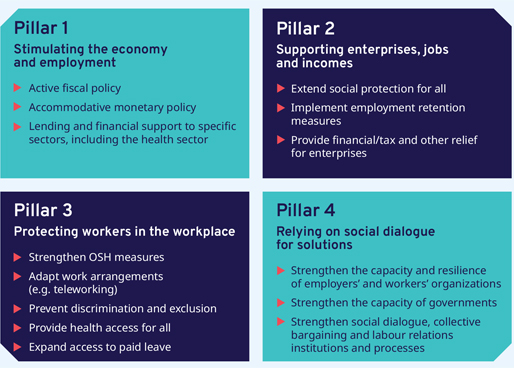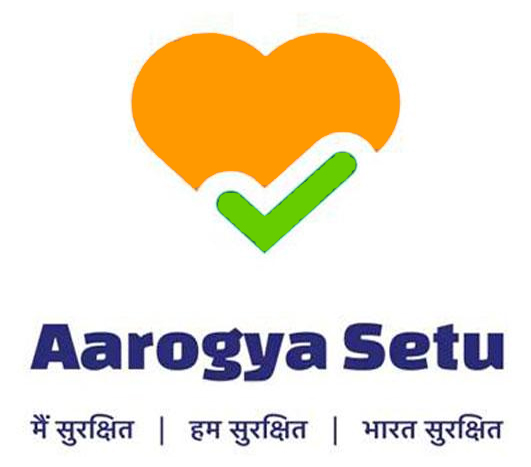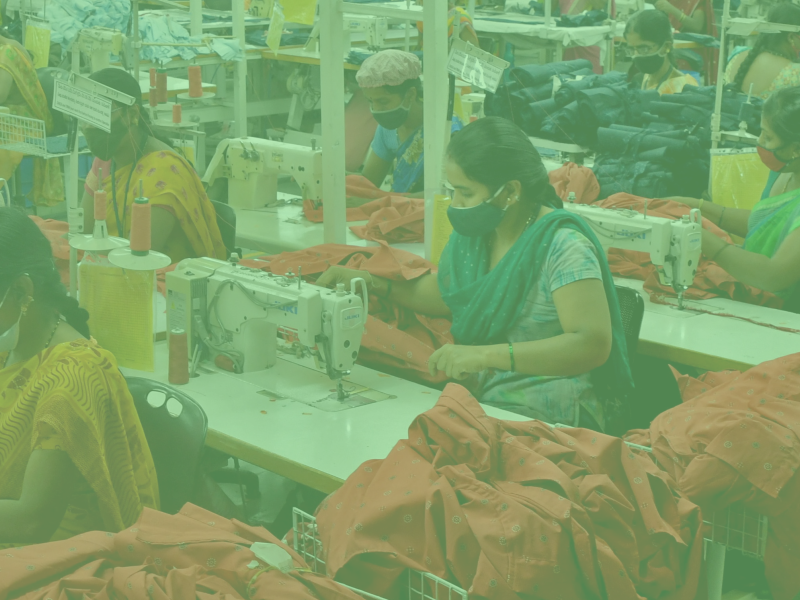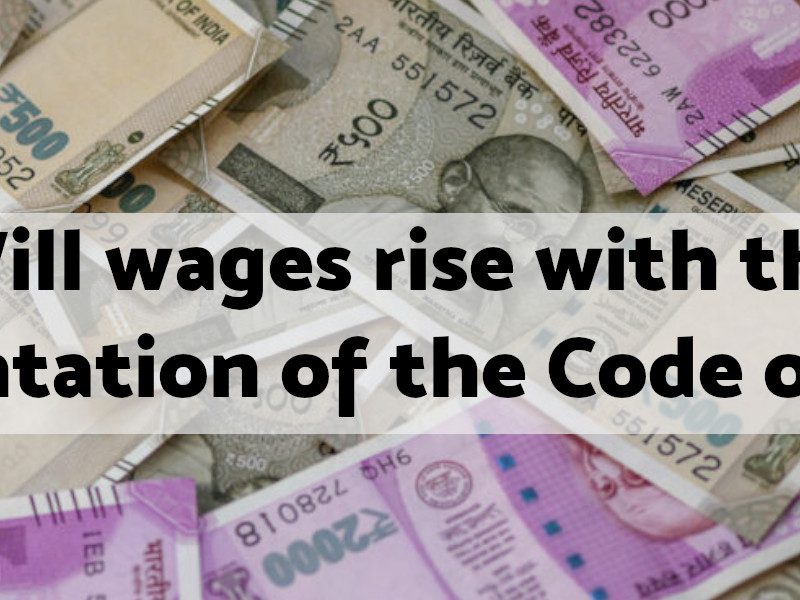According to an ILO report of 4 April 2020:
“…Full or partial lockdown measures are now affecting almost 2.7 billion workers, representing around 81 per cent of the world’s workforce.
In the current situation, businesses across a range of economic sectors are facing catastrophic losses, which threaten their operations and solvency, especially among smaller enterprises, while millions of workers are vulnerable to income loss and layoffs. The impact on income-generating activities is especially harsh for unprotected workers and the most vulnerable groups in the informal economy.
… the ILO’s new global estimates (as of 1 April 2020) indicate that working hours will decline by 6.7 per cent in the second quarter of 2020, which is equivalent to 195 million full-time workers.”
The ILO has proposed the following four pillar response approach to this crisis based on International Labour Standards:

But what we are seeing as government measures is quite different from these recommendations. In India, the central government is trying to push through the three remaining labour codes that severely restrict the rights of workers in the workplace, especially their right to protest, in this period through ordinances, bypassing the parliament. In the name of containment of the pandemic what we also are seeing in our country is a strengthening of the power of police. The lathicharge on thousands of migrant workers at the Bandra Station in Mumbai on 14 April hoping to catch a train to head back home is a brutal instance of this. This was no different from the over 50,000 migrants who had gathered at Anand Vihar bus terminus in Delhi on the 28 March but the response was quite different as the police get more empowered.
Let us not think this is an India-specific phenomenon.
ITALY Article 31 of their constitution has been implemented for the first time ever to put the police and army at the regional president’s disposal to suppress any form of protest that emerges as a result of the pandemic. Using this the government has sent in the army to the southern regions of Campania, Puglia and Sicily to guard commercial centres and streets, to control desperate people who may raid for food and other basic necessities.
HUNGARY A new law has granted the Prime Minister the power to sidestep Parliament and suspend existing laws and with the sole power to end the emergency.
GERMANY and POLAND Germany mobilised 15,000 soldiers to help local authorities while Poland activated thousands of troops to patrol streets under lockdown.
ISRAEL has shut down courts.
ISRAEL, S KOREA, SINGAPORE Have implemented invasive surveillance systems to monitor people and control the spread of the disease.
USA The Justice Department asked Congress for new powers, including a plan to eliminate legal protections for asylum seekers and detain people indefinitely without trial. The Congress refused this request.
Thus this pandemic has offered governments the opportunity to centralise power and suspend democratic institutions and rights.
We can already see certain measures being taken by governments across the world that indicate a restructuring of the world of work. While most employers have always tried to push for restructuring, it has always been a slow process with two steps forward and one step back due to resistance from workers and trade unions. But this pandemic has created an opportunity for employers to seek drastic measures at the workplace to revive the economy. This as we can already see will receive government support and may even be imposed with strengthening of the police force and other paramilitary forces.
What changes can we already see?
Right to Strike under attack
Portugal has banned strikes as part of the emergency measures. Italy’s implementation of Article 31 can also be used against strikes.
Right to Form Unions under attack
In a representation to the Ministry for Labour and Employment, government of India, the Gujarat Chamber of Commerce and Industry (GCCI) has sought a suspension of the provisions of formation of trade unions for at least one year. The GCCI claims that the unions, if allowed, will resort to ‘blackmailing the factory owners’, ‘threatening industry with the law’, and not allow ‘labourers to return to work’.
The language of this representation makes it aptly clear that the industry is using the pandemic as a smokescreen to violate laws protecting workers with impunity. There is no attempt as well to hide this intention.
Change in Working Hours
The governments in France and Germany changed the law to allow the extension of the working week in the so-called ‘key sectors’ from 48 to 60 hours. And Brazil now allows employers to reduce working hours and wages by 50%.
According to an article in Hindustan Times, the Union government is considering changing the length of a working day from 8 hours to 12 hours if the nationwide lockdown continues beyond 15 April. Although there are provisions for overtime pay, the government feels that exceptional circumstances call for exceptional provisions, which implies, workers will have to work longer hours without overtime wages to compensate for their additional work. What this also implies that the supposed loss incurred by the employer due to the lockdown is more important for the government to protect than the loss in income incurred by the worker during this same period.
| State | Rajasthan | Gujarat |
| Notification | 11 April | 17 April |
| Hours of Work Extension | From 8 hours to 12 hours per day & 48 hours to 72 hours a week | From 8 hours to 12 hours per day & 48 hours to 72 hours a week |
| Validity | 3 months | Indefinite |
| Applicability | For only essential goods manufacturers and distributors | All factories registered under Factories Act |
| Wage Rate for extra 4 hours | Overtime rate (double rate) | Normal Rate (NO OT rate) |
The Punjab government has also extended the working hours in line with the Rajasthan government notification.
Wage cuts
Auto companies are set to cut salaries in their effort to avoid sacking people as they seek to reduce costs during the lockdown which has worsened an already bleak situation.

With the travel industry in a complete collapse, Ixigo, a travel and hotel booking service, has decided to cut the salary of its entire staff. SpiceJet announced a 30 per cent pay cut for employees for March and announced “leave without pay” during March 25-31. Go Air had also announced leave without pay and salary payments in two tranches.
Indian Express announced huge salary cuts for their journalists and employees ranging from 10 to 30 per cent. This list can go on but these are only a few instances of a phenomenon that is much more widespread. To make matters worse:
Profit over Workers’ Safety and Health
| NAGREEKA EXPORTS LIMITED, a leading manufacturer and exporter of plastic-coated aluminium and steel tapes, laminates and aluminium and plastic containers, yarns, textiles, cotton, has filed a plea in the Supreme Court challenging the constitutional validity of the order issued by the Ministry of Home Affairs, Government of India on 29 March that directed all employers, in industries and shops and commercial establishments, to pay wages to all workers, by the due date, without any deduction, for the period their establishments are under closure during lockdown period. The exporter has further challenged the 31 March Maharashtra government order to pay full salary to all its staff, workers, contract workers, casual workers during the period of lockdown, when its factories are not operational. |
“We have no more wipes and hand sanitizer. We aren’t provided masks, don’t have the proper gloves, and not everything is being sanitized and cleaned before it comes to use,” said one Amazon warehouse worker in Arizona, USA according to a newspaper report. The situation gets worse as we get to poorer countries with less resources. Health workers across India have struggled to serve patients without protective equipment. Factories have opened without following government directions. And as we go down the wage and job hierarchy the situation gets bleaker. Waste workers across the country are exposed to a growing risk of contracting the virus.
Kachra Vahatuk Shramik Sangh, a union of contract safai workers in the city of Mumbai, sent a notice to Mumbai Municipal Corporation on 19 March demanding sanitisers, soaps, and personal protective equipment (PPE) including uniform, shoes, masks, gloves for 6500 contract safai workers employed in the city.
The ASHA (Accredited Social Health Activist), anganwadi and ANM (Auxiliary Nurse Midwife) workers have turned out to be the fronline fighters in this pandemic. But their lack of access to PPEs has not only endangered their own lives and their families but also the families that they serve.
| ROMANIAN FARM WORKERS vs GERMAN FARM LOBBY Germany has eased its virus restrictive border controls to allow seasonal Romanian agricultural workers for harvesting in the months of April and May. Despite large number of migrant workers, Romania’s militarised lockdown, enforced with police and army patrols in the streets, fining anyone caught out without a written statement from employers or doctors, has been able to keep the rate of infection and death due to the virus within control. Pushed by the agriculture lobbies, Germany has asked Romania to grant an exemption from the lockdown and allow farm workers to come to Germany for the harvest. Romania has agreed as it does not have any income support programme for these workers who usually work in other countries. According to the German farmers’ lobby: German workers are not used to working stooped in the fields for hours. They complain about backache. Romanians and Poles are stronger and they work weekends and public holidays. Thus the demand for low wage workers trumps the health risk of the migrant workers. |
Increased Surveillance
Invasive surveillance systems are being used by governments to monitor people and companies to monitor their employees. This would have been met with protests in the past, is at this time being welcomed in many cases to prevent the spread of the disease.
| ISRAEL Introduced a new regulation that allows tracking of movement of people using cell phone location data. By this the government can punish those who defy isolation orders with up to six months in prison without requiring permission from a judge. The government is very secretive about the data that it is gathering. The signals that are collected are cellular, rather than being connected to the GPS component of smartphones. Therefore turning off the device or the location app will not help to remove the tracking. The only way to avoid cellular surveillance is not to walk around with a cell phone. Attempt to extend the use of this regulation has been blocked by a parliamentary oversight group. IRAN The Government sent out a message to all citizens asking them to install an App called AC19, which was meant to diagnose the virus, but has collected massive data on citizens, including names, addresses, dates of birth, and it even tracks people’s location real time. This App has now been removed from GooglePlay. TAIWAN The Government has activated what it calls an ‘electronic fence’ which tracks mobile phone data and alerts authorities when someone, who is supposed to be quarantined, leaves home. |

On 6 April, Government of India, too has launched a tracking app called the Aarogya Setu which uses the app users’ mobile phone location and Bluetooth data to assess whether they have been within six feet of a person infected with COVID-19. The government has made it mandatory for all employees of E-Commerce Companies like Amazon, Zomato, UrbanClap etc to download this app. It is of course not surprising that the app has been developed in association with Haptik Technologies, a subsidiary of Reliance Industries. As on 25 April, the app has been downloaded by 75 million people, which simply means that the government can geo-locate anyone of these 75 million people at any point of time.
By allowing these apps for even a limited period, governments are gaining enormous power to track individuals wherever they may be. The pandemic has thus been used by governments across the world to legitimise invasive surveillance and even implement these. No one has any idea what data is being gathered from the people, even in this time bound period, and how that will be used against them in future.
Act Now, or Hurt Later
The intention of this piece is not to scaremonger. The intention of this piece is rather to prepare workers and their organisations for the measures that are going to become a part of our lives. The ones that we have listed are only a few drastic ones but there are many more forms of restructuring that we will see in the post corona phase.
Work from home may become a viable alternative for many employers thereby taking a large section of workers outside the ambit of any form of regulation. This will reduce cost to company per worker – no cost of transport, no cost of canteen, no cost of office space, no cost of consumables, no cost of child care. There will not be much difference between a woman executive in a multinational firm working from home, or a telemarketing executive or a home based beedi worker. These women will all be struggling to manage time between household chores, child and old age care and paid work. Unionising home based workers, men and women, will become as difficult as it is to unionise beedi or home based garment workers. To learn from our history, when beedi rolling moved from the factory to home, while the men struggled to protect their jobs, the women were pleased to get paid work at home. The gaping divide between the two sections of workers handed over victory to the employers. This mistake we should not repeat. Unity of all sections of workers is crucial in this trying time.



